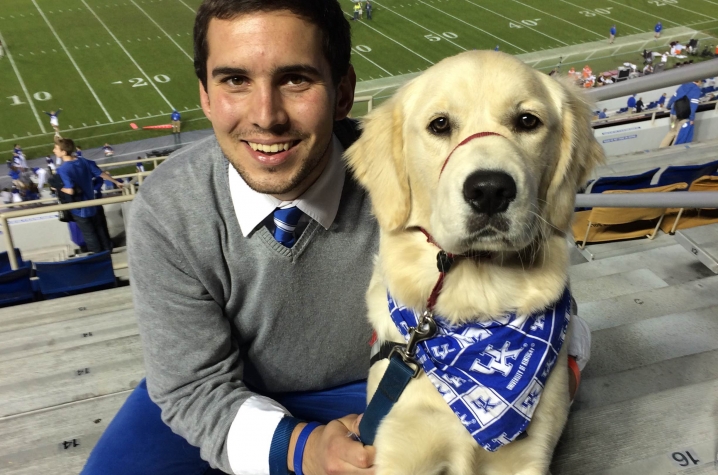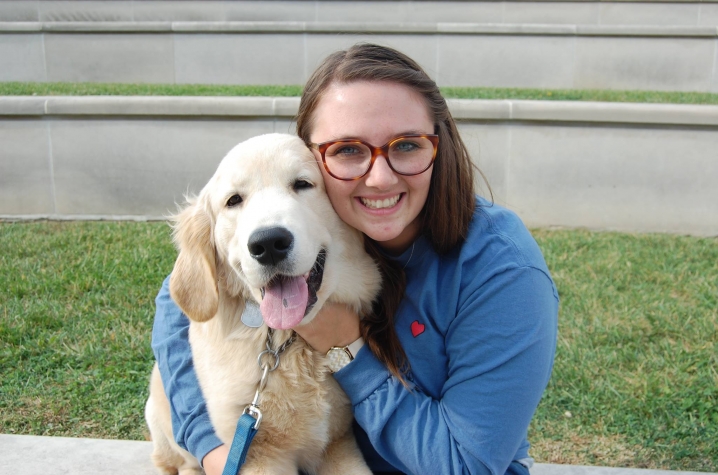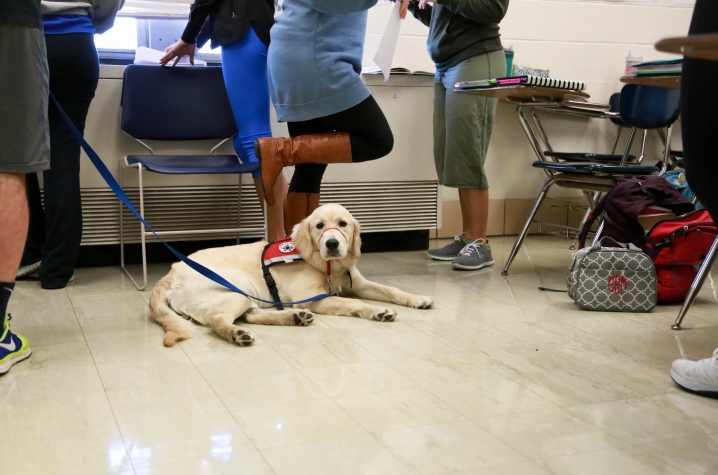Students Help Train Service Dogs for Children With Disabilities
LEXINGTON, Ky. (Jan. 14, 2015) – It’s not uncommon to see puppies donned in red service vests walking to class with students on the University of Kentucky campus. The trend began in 2009 when College of Education student Logan Bright established a service dog program at UK.
Bright transferred to UK from Wittenberg University, where she was familiar with the organization 4 Paws for Ability, and quickly started a chapter. Five years later, the UK chapter is thriving.
“A service dog can significantly change someone’s life. I couldn’t think of a more fun way to help someone out,” said Luke Nolte, a senior majoring in special education (moderate and severe disabilities) who is currently training a dog named Una for the organization.
Nolte brings Una to the special education classroom where he is completing a practicum.
“It has been really good for Una to be exposed to children that age, (especially those) with disabilities, because that is the demographic she will be working with in the future,” Nolte said. “It was also beneficial for the students in the class. At first the students would run up to Una and pet her. Now they have learned to ask if they can pet Una, and hopefully this will carry over to when they are out in the community and see a stranger with a dog.”
Student trainers take the dogs everywhere they go (class, restaurants, mall, library etc.), and are required to complete two training sessions per month. After the dogs are trained and socialized by UK students, they go through additional training before they graduate as official service dogs and are placed with a family.
“It has been really amazing for my students,” said Gabrielle Bowers, a recent graduate of the special education (learning and behavior disorders) program. “I have had my puppies in training with me at practicums and my student teaching, and we’ve been able to use the dogs as behavior incentives and for different purposes in my classrooms. It’s been really great to watch my students respond to the puppies.”
4 Paws for Ability places dogs to serve in areas such as hearing ear dogs, autism assistance dogs and mobility assistance dogs. The organization specializes in placements with people who have been turned away by other agencies, particularly children.
“When I found out the dogs benefit children with disabilities, I fell in love with the program and have been involved ever since,” Bowers said.
Bowers graduated from UK in December and is now in graduate school for behavior therapy.
“I knew I wanted to do some type of therapy with children with special needs. Through my four years here, I’ve fallen in love with behavior therapy,” she said.
Upon graduating, Nolte plans to go to graduate school for occupational therapy and would like to work in a school setting or specifically with wounded soldiers/veterans.
“I really wanted a career where I can help improve their life and at the same time get to know someone on a personal level. I have grown up with close family friends that have had intellectual disabilities and have always had a soft spot for individuals with disabilities,” Nolte said.
Bowers said although there are fun aspects to having a dog at all times, most people do not realize the extra level of responsibility it requires.
“It takes you twice as long to get anywhere with a dog,” she said.
One of the most common questions they receive is whether it is OK to pet the dogs.
“Yes, we encourage people to pet the puppies,” Bowers said. “As long as people ask first, there is no problem with them petting the dogs.”
Bowers grew up with dogs in her family and now it seems service dogs may be part of her life for a long time. Her parents have started volunteering with 4 Paws for Ability and have a breeder dog through the organization.
To find out more about 4 Paws for Ability, visit http://4pawsforability.org/. Information about the Special Education Program at the UK College of Education is available at https://2b.education.uky.edu/edsrc/.
MEDIA CONTACT: Whitney Harder, 859-323-2396, whitney.harder@uky.edu







